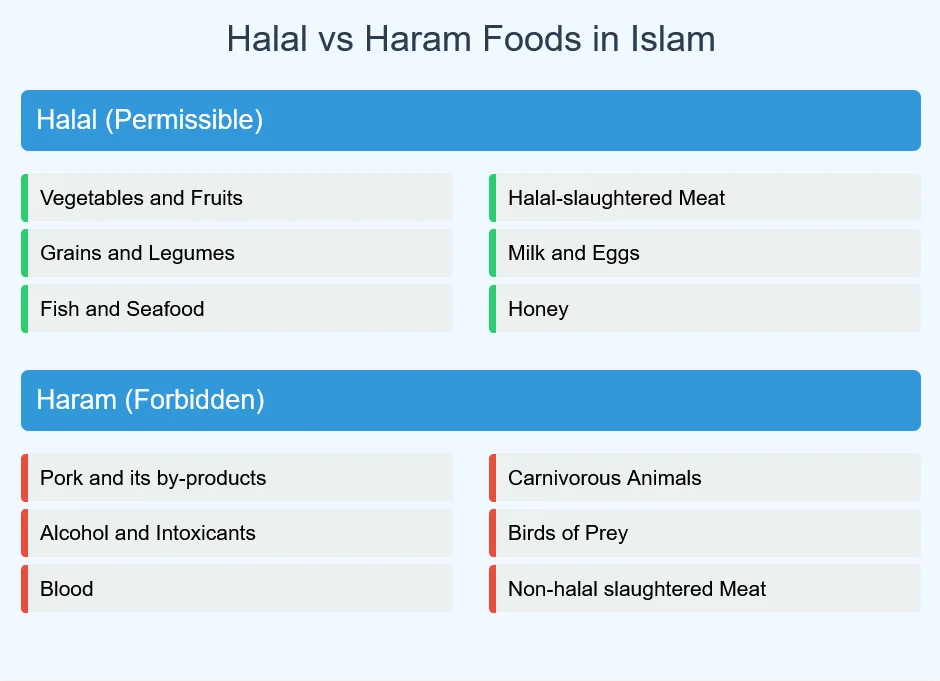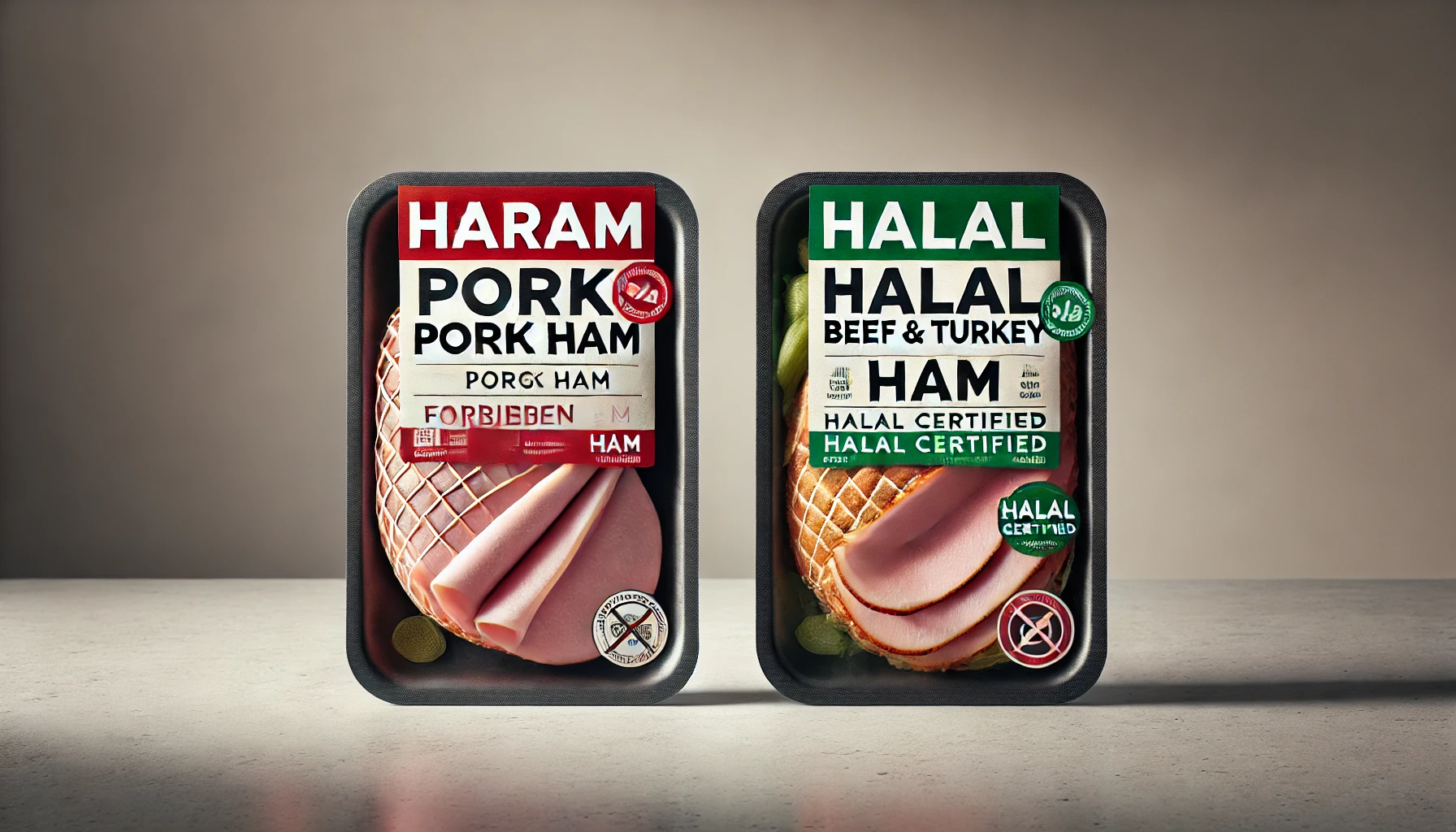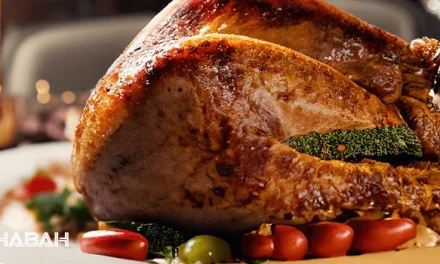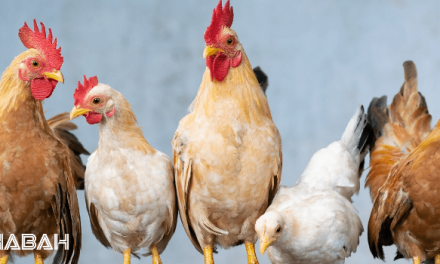Is Ham Halal? A Comprehensive Guide to Islamic Dietary Laws
In the world of Islamic dietary laws, the question “Is ham halal?” is one that frequently arises. This comprehensive guide will delve deep into the intricacies of halal and haram foods, with a specific focus on ham and its status in Islamic dietary practices. Whether you’re a Muslim seeking clarity or someone interested in understanding Islamic food regulations, this article will provide you with in-depth knowledge and insights.
Understanding Halal and Haram in Islamic Dietary Laws
Before we address the specific question of whether ham is halal, it’s crucial to understand the concepts of halal and haram in Islamic dietary laws.

What does ‘Halal’ mean?
Halal is an Arabic term that translates to “permissible” or “lawful” in English. In the context of food, halal refers to any food that is allowed for consumption under Islamic law. The Quran provides guidance on what is considered halal:
“O ye who believe! Eat of the good things that We have provided for you.” (Quran 2:172)
Halal foods include:
- Most vegetables, fruits, and grains
- Meat from herbivorous animals slaughtered according to Islamic law
- Fish and seafood
- Milk and eggs from halal animals
What does ‘Haram’ mean?
Haram, on the other hand, means “forbidden” or “prohibited”. Foods that are haram are not permissible for Muslims to consume. The Quran explicitly mentions certain foods as haram:
“Forbidden to you (for food) are: dead meat, blood, the flesh of swine, and that on which hath been invoked the name of other than Allah.” (Quran 5:3)
Some examples of haram foods include:
- Pork and its by-products
- Animals not slaughtered according to Islamic law
- Alcohol and intoxicants
- Carnivorous animals and birds of prey
The importance of following halal dietary guidelines in Islam
Following halal dietary guidelines is not just about physical health but also spiritual well-being. Muslims believe that adhering to these laws is an act of obedience to Allah and a way to maintain purity in body and spirit.
The Origin and Composition of Ham
To understand why ham is a subject of debate in Islamic dietary laws, we need to examine what ham is and how it’s made.
What is ham and how is it made?
Ham is a type of meat product that is typically made from the hind leg of a pig. The meat is cured, which means it’s treated with salt, sugar, and sometimes other chemicals to preserve it and enhance its flavor.
The curing process can involve:
- Wet curing: Soaking the meat in a brine solution
- Dry curing: Rubbing the meat with a mixture of salt and other seasonings
- Smoking: Exposing the meat to smoke from burning or smoldering material
Types of meat used in ham production
While traditional ham is made from pork, there are other varieties available:
| Type of Ham | Source |
|---|---|
| Pork Ham | Hind leg of a pig |
| Turkey Ham | Turkey thigh meat |
| Beef Ham | Beef leg or shoulder |
| Chicken Ham | Chicken thigh meat |
It’s important to note that even though products like “turkey ham” or “chicken ham” exist, they are named “ham” due to the similar curing process and flavor profile, not because they contain pork.
Is Ham Halal? The Islamic Perspective
Now, let’s address the central question: Is ham halal?
Quranic verses related to permitted and prohibited foods
The Quran is explicit about the prohibition of pork:
“He has only forbidden to you dead animals, blood, the flesh of swine, and that which has been dedicated to other than Allah.” (Quran 2:173)
This verse clearly states that the flesh of swine (pig) is forbidden for Muslims to consume.
Hadith on pork and its derivatives
Numerous Hadith (sayings and actions of Prophet Muhammad) reinforce the prohibition of pork. For example:
“Allah and His Messenger made illegal the trade of alcohol, dead animals, pigs and idols.” (Sahih al-Bukhari 2236)
Scholarly consensus on the status of ham in Islam
There is a unanimous consensus among Islamic scholars that ham made from pork is haram (forbidden) for Muslims to consume. This ruling extends to all pork products, regardless of how they are prepared or processed.
Why Ham is Considered Haram in Islam
The prohibition of ham in Islam stems from several factors:
-
Divine Command: The primary reason is that it’s a direct command from Allah in the Quran.
-
Health Considerations: Some scholars point out potential health risks associated with pork consumption, such as the risk of trichinosis.
-
Spiritual Purity: Consuming only halal foods is seen as a way to maintain spiritual purity and closeness to Allah.
-
Obedience and Submission: Following dietary laws is an act of obedience and submission to Allah’s will.

Common Misconceptions About Ham and Halal Status
There are several misconceptions about ham and its halal status that need to be addressed:
“Turkey ham” and its halal status
Turkey ham is not made from pork, but it’s important to note that the term “ham” in this context refers to the curing process, not the meat source. While turkey itself can be halal if slaughtered according to Islamic law, Muslims should be cautious and ensure that:
- The turkey was slaughtered according to Islamic guidelines
- There was no cross-contamination with pork products during processing
- No haram ingredients were used in the curing process
Misconceptions about processing methods making pork halal
Some people mistakenly believe that certain processing methods can make pork halal. This is not true. No amount of processing can change the fundamental nature of pork or make it permissible for Muslim consumption.
The issue of cross-contamination in food production
Even if a product doesn’t contain pork, there’s a risk of cross-contamination in facilities that process both pork and non-pork products. This is why many observant Muslims prefer products with halal certification.
Halal Alternatives to Ham
For Muslims who want to enjoy foods similar to ham, there are several halal alternatives available:
- Beef-based alternatives: Some companies produce beef products that are cured and flavored to mimic ham.
- Poultry-based alternatives: Turkey or chicken can be processed to have a similar texture and flavor to ham.
- Plant-based alternatives: With the rise of plant-based meats, there are now vegan “ham” products available that are suitable for Muslims.
| Alternative | Taste Similarity | Texture Similarity | Nutritional Value |
|---|---|---|---|
| Beef “Ham” | Moderate | High | High in protein |
| Turkey “Ham” | High | Moderate | Lean protein |
| Vegan “Ham” | Low to Moderate | Moderate | Varies |
How to Ensure Your Food is Halal
For Muslims, ensuring that food is halal is an important part of daily life. Here are some tips:
- Read food labels carefully: Look for pork-derived ingredients like gelatin, lard, or enzymes.
- Look for halal certification: Many products now carry halal certification logos.
- Ask questions when dining out: Don’t hesitate to ask about ingredients and preparation methods.
The Global Perspective: Ham Consumption and Halal Markets
The global halal food market has seen significant growth in recent years:
- The global halal food market size was valued at $1.9 trillion in 2020 and is expected to grow at a CAGR of 11.25% from 2021 to 2028.
- Many non-Muslim countries are now producing halal-certified products to cater to Muslim consumers and tourists.
- In countries like Spain, known for their ham production (such as jamón ibérico), there’s been an increase in halal tourism and efforts to provide halal alternatives.
Case Study: Halal Ham in Spain
In 2014, a Spanish company in Cumbres Mayores, Andalusia, created a halal “ham” made from lamb and beef. The product, developed by Faysal Mrad Dali, was designed to give Muslims the opportunity to enjoy a product similar to the traditional Spanish jamón while adhering to Islamic dietary laws.
Frequently Asked Questions: Is Ham Halal
Traditional ham, which is made from pork, is not halal for Muslims as it is considered haram. However, halal ham is made from alternative meats that comply with halal standards.
What is halal ham made from?
Halal ham is typically made from meats such as beef, lamb, or poultry that has been halal certified and processed in accordance with Islamic law.
Can Muslims eat bacon or sausage that is labeled as halal?
Yes, Muslims can eat bacon or sausage labeled as halal, provided that it is made from halal-certified ingredients and does not contain any pork or animal fats from non-halal sources.
Does halal ham taste like traditional ham?
Yes, halal ham can taste exactly like traditional ham, especially products designed to mimic the flavor and texture of pork ham, made from beef or turkey.
Are there specific halal products available that resemble jamón?
Yes, there are halal products that resemble jamón, such as halal dry-cured ham made from beef or turkey, which are specially processed to replicate the taste and texture of traditional jamón.
How do companies certify their products as halal?
Companies must follow specific guidelines set by halal certifying bodies, which include sourcing animal products from halal animals, proper slaughtering methods, and ensuring no cross-contamination with haram substances.
What should I look for when buying halal ham?
When buying halal ham, look for the halal certification label on the packaging, and ensure that it is made from halal-certified meats such as beef or poultry, not pork.
Are halal products like halal ham available in the U.S.?
Yes, halal products including halal ham are increasingly available in the U.S., particularly in areas with large Muslim populations and in stores that cater to diverse dietary needs.
Can Muslims eat halal chicken, and is it different from halal ham?
Yes, Muslims can eat halal chicken, which is different from halal ham as chicken is poultry and can be halal certified, while halal ham is typically made from other meats like beef or turkey.
Is turkey ham halal?
Turkey ham can be halal if the turkey is slaughtered according to Islamic guidelines and no haram ingredients are used in processing. However, always check for halal certification.
Can ham become halal through any processing method?
No, pork ham can never become halal through any processing method. The prohibition of pork is absolute in Islam.
Are all non-pork hams automatically halal?
Not necessarily. Even non-pork “hams” need to be prepared according to Islamic guidelines to be considered halal. This includes proper slaughter methods and avoiding haram ingredients in processing.
How can I be sure a product doesn’t contain ham or pork derivatives?
Always check the ingredients list carefully and look for halal certification. When in doubt, contact the manufacturer or consult with a knowledgeable Islamic authority.
Conclusion
In conclusion, ham made from pork is not halal and is strictly forbidden in Islam. This prohibition extends to all pork products, regardless of processing methods. While there are halal alternatives available that mimic the taste and texture of ham, Muslims must remain vigilant about food choices and seek proper halal certification when in doubt.
Understanding and following Islamic dietary laws is an important aspect of a Muslim’s faith and daily life. It’s not just about avoiding certain foods, but about submitting to Allah’s will and maintaining physical and spiritual purity.
As the global halal food market continues to grow, Muslims have more options than ever for enjoying a wide variety of foods while staying true to their religious principles. Always remember, when in doubt about the halal status of any food, it’s best to err on the side of caution and seek guidance from knowledgeable Islamic authorities.
By staying informed and making conscious food choices, Muslims can navigate the complex world of modern food production while adhering to the timeless principles of their faith.





